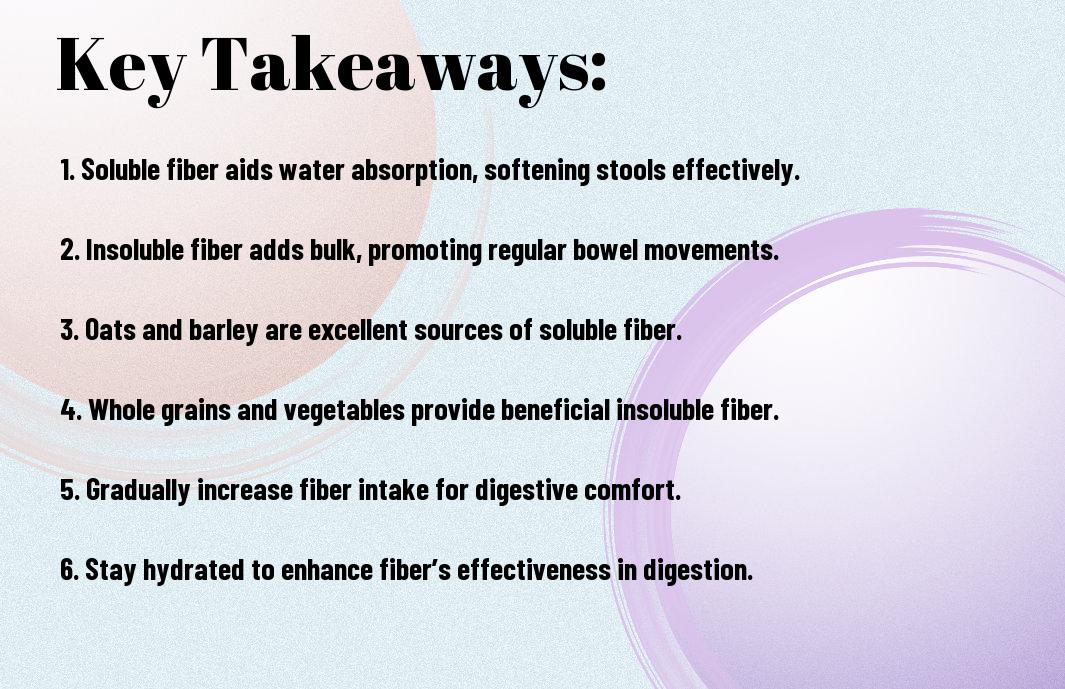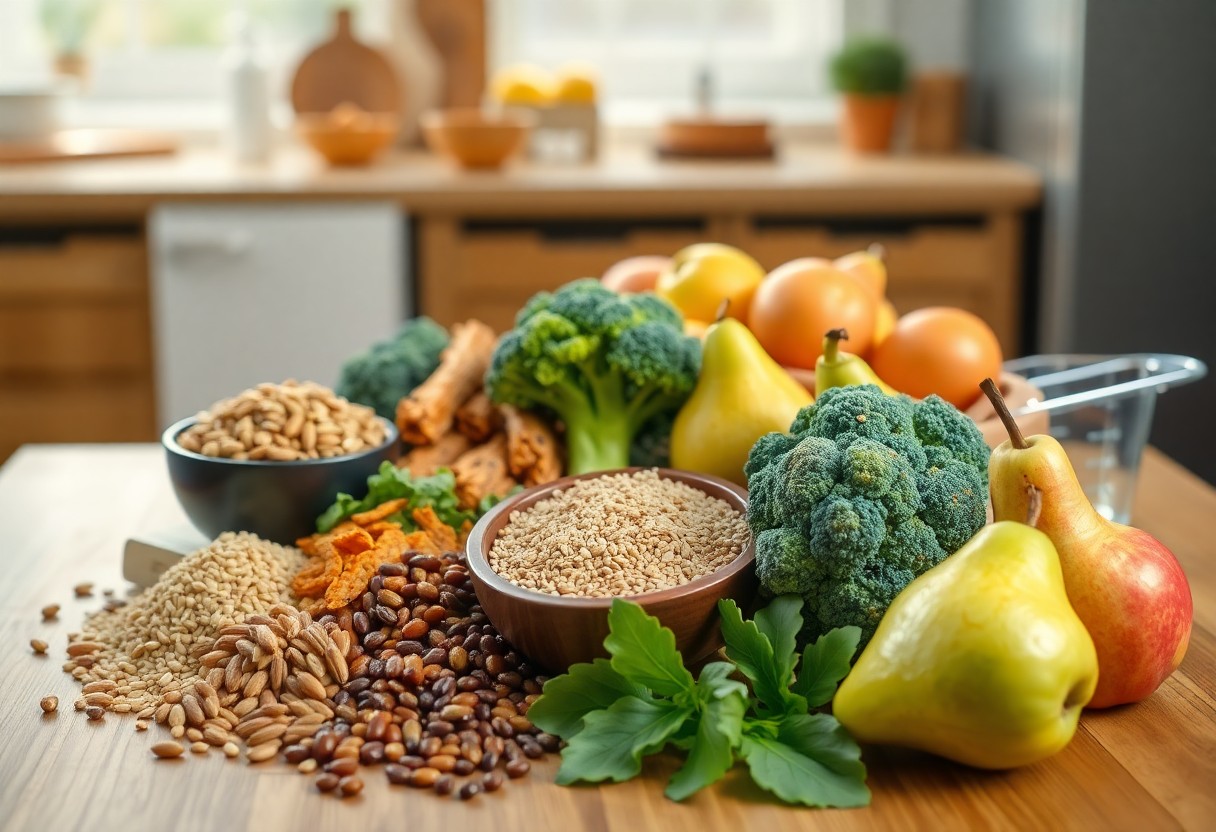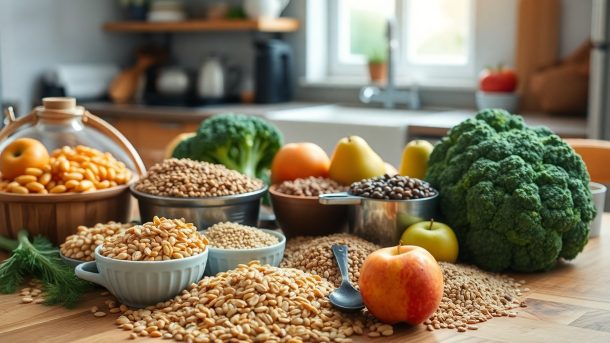Fiber plays a vital role in your digestive health, especially when it comes to alleviating constipation. Choosing the right type of fiber can significantly impact your bowel regularity and overall comfort. In this post, you’ll learn which fibers are most effective for easing constipation, how to incorporate them into your diet, and tips for maintaining a healthy digestive system. Understanding the differences between soluble and insoluble fiber will empower you to make informed dietary choices that promote regularity and well-being.
Key Takeaways:
- Soluble Fiber is effective in alleviating constipation as it absorbs water and forms a gel-like substance, making stools softer and easier to pass.
- Insoluble Fiber adds bulk to the stool and helps food move through the digestive tract more quickly, which can aid in preventing constipation.
- Incorporating a variety of fiber sources, including fruits, vegetables, whole grains, and legumes, can optimize digestive health and enhance stool regularity.
Understanding Constipation
To grasp how to alleviate constipation effectively, it’s important to first understand what it is. Constipation is a common digestive issue characterized by infrequent bowel movements or difficulty passing stool. This condition can lead to discomfort, bloating, and a general feeling of sluggishness. Regular digestive health is key, as it affects your overall well-being. Understanding the factors contributing to constipation is vital for you to find effective solutions.
Causes of Constipation
By identifying the causes of constipation, you can take proactive steps to improve your digestive health. Factors such as a low-fiber diet, inadequate hydration, and a sedentary lifestyle are common contributors. Certain medications and medical conditions can also lead to constipation, making it important to evaluate your habits and consult with a healthcare professional if necessary.
Symptoms of Constipation
Between the various symptoms of constipation, you may experience infrequent bowel movements, hard or lumpy stools, straining during bowel movements, and feelings of incomplete evacuation. These symptoms can range in severity and duration, affecting your daily life and comfort levels.
In addition to the primary symptoms, you may also notice bloating, abdominal pain, and discomfort. These signs can signal that your digestive system is not functioning optimally and that it’s time to reassess your fiber intake and lifestyle choices. Paying attention to these symptoms can guide you in making necessary adjustments for a healthier digestive process.


The Role of Dietary Fiber
It is well-known that dietary fiber plays a significant role in maintaining digestive health, particularly in alleviating constipation. By adding bulk to your stool and promoting regular bowel movements, fiber helps to create a smoother digestive process. Incorporating fiber-rich foods into your diet daily can lead to improvements in overall gut function and enhance your comfort.
Types of Dietary Fiber
It is important to understand the different types of dietary fiber and their functions:
| Type | Function |
| Soluble Fiber | Absorbs water and forms a gel-like substance, aiding in stool formation. |
| Insoluble Fiber | Adds bulk to stools and enables faster passage through the digestive tract. |
| Fermentable Fiber | Feeds beneficial gut bacteria, promoting a healthy microbiome. |
| Non-Fermentable Fiber | Remains undigested and helps to push waste through the intestines. |
- Soluble fiber can be found in foods like oats, apples, and beans.
- Insoluble fiber is abundant in whole grains, nuts, and vegetables.
- Fermentable fiber sources include legumes and some fruits.
- Non-fermentable fiber is typically found in whole grain products.
Thou should focus on incorporating both types of fiber for optimal digestive health.
Recommended Daily Intake
One of the key factors for preventing constipation is ensuring you consume the right amount of dietary fiber daily. Adults should aim for at least 25-30 grams of fiber each day, depending on individual needs and dietary preferences.
Another important aspect to keep in mind is that gradually increasing your fiber intake would be beneficial. Sudden changes in your diet can lead to discomfort. Start by adding fiber-rich foods to your meals while also increasing your water intake to aid digestion. By taking a balanced approach, you can enjoy improved digestive health and a reduction in constipation over time.
Soluble Fiber: Benefits and Sources
All types of fiber play an crucial role in digestive health, but soluble fiber particularly shines when it comes to alleviating constipation. This type of fiber dissolves in water, forming a gel-like substance that helps to soften stool and make it easier to pass. Additionally, soluble fiber aids in regulating blood sugar levels and promoting heart health, providing you with multiple benefits beyond digestion.
What is Soluble Fiber?
What distinguishes soluble fiber is its ability to dissolve in water, transforming into a viscous gel in your digestive tract. This process not only slows down digestion but also helps in absorbing nutrients more effectively. By absorbing water, soluble fiber can ease the movement of stool through your intestines, thereby alleviating constipation.
Best Sources of Soluble Fiber
At the grocery store, you’ll find a wealth of options packed with soluble fiber. Foods rich in this beneficial fiber include oats, barley, beans, lentils, fruits like apples and citrus, and various vegetables such as carrots and psyllium. Incorporating these foods into your diet will enhance your fiber intake and improve your digestive health.
Indeed, focusing on soluble fiber sources can significantly boost your digestive function. Oats and barley are particularly effective as breakfast staples, while beans and lentils make excellent additions to soups and salads. With respect to fruits, apples, bananas, and berries are delicious options that can diversify your intake. Adding vegetables like carrots and peas can also help meet your fiber needs while providing crucial vitamins and minerals. By choosing these foods, you can create a well-rounded diet that supports your gastrointestinal health.
Insoluble Fiber: Benefits and Sources
Despite the prevalent focus on soluble fiber, insoluble fiber plays an equally vital role in digestive health. It adds bulk to your stool, facilitating regular bowel movements and preventing constipation. Additionally, it helps maintain a healthy weight and can lower the risk of certain digestive disorders. Incorporating insoluble fiber into your diet can greatly enhance your gastrointestinal well-being.
What is Insoluble Fiber?
Any fiber that does not dissolve in water is classified as insoluble fiber. It primarily aids in moving food through your digestive tract and adds bulk to the stool. Unlike soluble fiber, it does not gel or form a gel-like substance; instead, it remains intact as it travels through your system, providing crucial support for optimal gut function.
Best Sources of Insoluble Fiber
Best sources of insoluble fiber include whole grains, nuts, seeds, and many vegetables. Foods like bran, brown rice, and leafy greens are particularly rich in this type of fiber. Adding these items to your meals can significantly increase your overall fiber intake and promote a healthier digestive system.
Considering the benefits of incorporating insoluble fiber into your diet, focus on foods such as whole grain bread, bulgur, quinoa, and various vegetables like carrots, cucumbers, and celery. Aim to include a variety of these sources in your meals to ensure you’re receiving adequate amounts of insoluble fiber, which will support your digestive health and help prevent constipation effectively.
Comparing Fiber Types for Constipation Relief
Unlike popular belief, not all fiber types are created equal when it comes to relieving constipation. Consider the following differences between soluble and insoluble fiber:
- Soluble fiber dissolves in water, forming a gel-like substance.
- Insoluble fiber does not dissolve, adding bulk to your stool.
- Soluble fiber can help manage blood sugar and cholesterol levels.
- Insoluble fiber enhances bowel movements and overall digestive speed.
- Both types are beneficial, but may serve different purposes.
Assume that the combination of both types can lead to optimal digestive health.
| Fiber Type | Function |
|---|---|
| Soluble Fiber | Slows digestion, helps regulate glucose and cholesterol. |
| Insoluble Fiber | Adds bulk to stool, promoting regularity. |
| Sources | Oats, beans, fruits (apples, oranges). |
| Sources | Whole grains, nuts, vegetables (carrots, celery). |
| Benefits | Diverse health benefits including heart health. |
Effectiveness of Soluble vs. Insoluble Fiber
Any discussion about fiber for constipation relief must highlight the effectiveness of both soluble and insoluble fiber. Soluble fiber can soften the stool, making it easier to pass, while insoluble fiber adds bulk, promoting regularity. Combining these fibers in your diet can help you achieve maximum relief from constipation and support overall digestive health.
Incorporating Fiber into Your Diet
Fiber can be easily incorporated into your daily meals, enhancing both your diet and digestive health. You can add fruits, vegetables, whole grains, and legumes to every meal to increase your fiber intake.
To ensure you are getting enough fiber, start by gradually adding fiber-rich foods to your meals. Aim for a colorful plate filled with various fruits and vegetables, swap out white bread for whole-grain bread, and consider incorporating beans and lentils into soups or salads. Drinking plenty of water will also help the fiber do its job effectively, so keep hydration in mind as you boost your fiber intake.
Additional Tips for Managing Constipation
Now that you know the types of fiber that can help relieve constipation, consider these additional strategies for managing your symptoms:
- Prioritize regular physical activity.
- Set a consistent toilet routine.
- Incorporate probiotics into your diet.
- Be cautious with fiber supplements; start slowly.
Knowing how to combine these tips with the right fiber can improve your overall digestive health. For more insights on effective fiber types, check out Which Type of Fiber Is Best for Constipation? Study ….
Hydration and Lifestyle Changes
Additional lifestyle modifications can significantly aid in alleviating constipation. Staying properly hydrated is imperative, as water helps soften stool and promotes regular bowel movements. Aim to drink adequate fluids throughout the day and consider incorporating hydrating foods like fruits and vegetables into your diet.
When to Consult a Healthcare Professional
Tips for when to seek professional advice include situations where your constipation persists despite dietary changes or if you experience severe discomfort or other concerning symptoms.
But if you notice blood in your stool, experience unexplained weight loss, or have persistent abdominal pain, it’s important to consult a healthcare professional promptly. These could be signs of an underlying condition that requires further evaluation. Seeking expert guidance can help you identify the most effective treatment plan tailored to your needs.
Summing up
Ultimately, when choosing the best fiber for constipation, you should consider both soluble and insoluble fibers. Soluble fibers, found in oats, beans, and fruits, help soften stool, while insoluble fibers, found in whole grains and vegetables, add bulk to your stool, promoting regularity. A balanced intake of both types can significantly improve your digestive health. Incorporating a variety of fiber-rich foods into your diet, along with staying hydrated, will support effective bowel movements and alleviate discomfort associated with constipation.
FAQ
Q: What types of fiber can help alleviate constipation?
A: There are two main types of dietary fiber: soluble and insoluble. Soluble fiber, found in foods like oats, beans, and fruits, can help soften stool by absorbing water. Insoluble fiber, found in whole grains, nuts, and vegetables like carrots and celery, adds bulk to the stool, helping it move through the digestive tract more efficiently. Both types are important in managing constipation.
Q: How much fiber should I consume daily to combat constipation?
A: The recommended daily intake of fiber for adults is about 25 grams for women and 38 grams for men. If you are trying to alleviate constipation, increasing your fiber intake gradually can be beneficial, giving your digestive system time to adjust.
Q: Are there specific foods I should include in my diet for optimal fiber intake?
A: Yes, including foods such as whole grains (like brown rice and whole wheat bread), fruits (like apples, pears, and berries), vegetables (like broccoli and spinach), legumes (such as lentils and chickpeas), and nuts can help provide a good balance of soluble and insoluble fiber, promoting regular bowel movements.
Q: Can fiber supplements be effective for constipation, and which ones are recommended?
A: Fiber supplements can be effective in improving bowel regularity, especially if dietary fiber intake is insufficient. Popular options include psyllium husk, methylcellulose, and inulin. It’s advisable to consult a healthcare professional before starting any supplements to ensure they are appropriate for your specific situation.
Q: Along with fiber, what other lifestyle changes can help with constipation?
A: In addition to increasing fiber intake, staying hydrated is important, as water helps fiber do its job more effectively. Regular physical activity can also promote healthy bowel movements. Establishing a regular bathroom routine and not ignoring the urge to have a bowel movement can further enhance digestive health.


